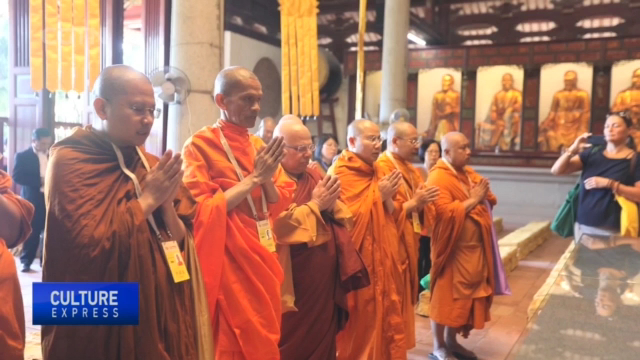
18:52, 30-Oct-2018
5th World Buddhism Forum: Religion has ancient and enduring ties to China
Updated
18:36, 02-Nov-2018
02:47

The 5th World Buddhist Forum is set to close in Eastern China's Fujian Province today. Monks, scholars and religious experts have gathered to discuss the spiritual practice on a global scale. Omar Khan takes a look at the SIGNIFICANCE of Buddhism in China, and what its FUTURE entails.
A mix of beliefs, spirituality and religious elements, Buddhism has defined Chinese culture since the Han Dynasty.
The faith developed alongside Daoism over the centuries, with the Mahayana branch the prominent form, of what is known as Chinese Buddhism. But what does it mean now and how does it connect with Chinese society and mankind?
VEN. DR. TAMPALAWELA DHAMMARATANA DIRECTOR GENERAL, LINH SON BUDDHIST ACADEMY "Of course this is a great country, they can't separate from Buddhism. China is the country where civilization is enriched by Buddhism, Confucianism and Taoism, these three religions."
And even for those who have come to China to pursue other endeavors, Buddhism, is finding its way.
MAX SHAOLIN TEMPLE "I come to Shaolin Temple, in China, to practice kungfu, the kungfu, and the Buddhism, is the same. Sometimes I'm learning the Buddhist philosophy. I like it. I think it's good."
OMAR KHAN PUTIAN CITY, FUJIAN PROVINCE "The significance of this global gathering is that those from the religious field, can get together and address Buddhism and its path forward. And specifically for China, a country which is home to some 240 million Buddhist followers, and some 20-thousand Buddhist temples, this platform here is vital to preserving those spiritual values."
Yet one of the bigger questions that remains. How is Buddhism being practiced, and what's next for the faith?
VEN. DR. KALLANCHIYE RATHANASIRI THERO CHIEF INCUMBENT, ABHAYAGIRI TEMPLE "A good future, because of Lord Buddha's teaching. If we develop science, Lord Buddha says this is a real truth. If science is developed, we can see science through Buddhism."
XIAN CONG CHINESE BUDDHIST MONK "I think Buddhism in China will have a good future, because more and more people understand and know Buddhism, and believe in Buddhism, and become practitioners."
For an ancient creed that many may assume to have declined over the centuries, Buddhism is alive and well.
And for these monks, celebrating yet another gathering of philosophical exchanges, there's no reason to not be smiling.
Omar Khan, CGTN, Putian City.

SITEMAP
Copyright © 2018 CGTN. Beijing ICP prepared NO.16065310-3
Copyright © 2018 CGTN. Beijing ICP prepared NO.16065310-3